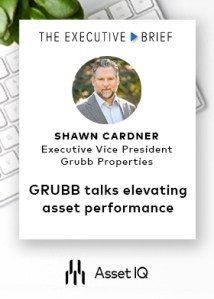Share This
Related Posts
Tags
Beyond BI
By Lee Ann Stiff on Sep 15, 2020 in News
“Grubb has a top-down philosophy of promoting long-term residents,” said Shawn Cardner, executive vice president of operations at Grubb Properties. “We always felt our long-term resident program that caps rent at five years was the right thing to do and was working, but we didn’t have a lot of data on it. We do now thanks to deep property and portfolio analytics, and that’s very exciting.”
The analytics Cardner refers to come from Yardi Asset IQ, part of the Yardi Elevate Suite for multifamily. Asset IQ is taking Grubb beyond business  intelligence by providing property, portfolio and market analytics for benchmarking, budgeting, analyzing collections and adjusting quickly to changing needs.
intelligence by providing property, portfolio and market analytics for benchmarking, budgeting, analyzing collections and adjusting quickly to changing needs.
Cardner and other execs get fast insights from dashboards that display real-time performance with drilldown to details. They not only have stats that show residents are staying longer but can also “get into the weeds” and see what’s behind the numbers to really understand what’s happening at their properties.
Validating a long-term renter program
At one of Grubb’s apartment communities, an impressive 42% increase in length of residency was only part of the story. “Using data from Asset IQ, we correlated the success of a long-term resident program to important financial metrics: $30 increase in rental income per unit and $32 lower expenses,” said Cardner.
Grubb utilizes the benchmark KPIs on its Asset IQ dashboard for renewal rates, renewal percentages and new lease rates. The company also likes to keep a close eye on maintenance expenditures. Cardner added, “I see benchmark data as a tool that brings visibility into possible areas of improvement.”
Benchmarking against peers and budget
With Asset IQ, Grubb can compare its actual leasing, financial and operational data to a defined peer set and to its own budget. An easy-to-use dashboard displays KPI visuals for performance updates at a glance. For example, a green thumb up icon shows the company where it’s doing better than both benchmark and budget, a yellow thumb up icon indicates it’s doing better in one area but not both and a red thumb down icon means it’s not doing as well in either area. Each KPI provides drilldown to underlying data so Grubb can quickly understand issues and take appropriate action.
“The benchmarking in Asset IQ has been valuable — we found market volatility that we were unaware of. As an operator, we have always been heavy on the expense side because we are about the long-term play. One downside of that is it’s easy to not focus on expenses as much. But once we looked at the data, we did see markets where we had applied portfolio generalizations and were spending more than our peers,” said Cardner.
Saving time and money
Cardner explained that with Asset IQ he can dig into turn costs at specific properties and analyze them on a line item basis. With regard to marketing, Grubb makes sure it’s in line with its peers — but where it isn’t, can ask why and find the solution.
Before using Forecast IQ, also part of the Yardi Elevate Suite, one of Grubb’s biggest challenges was seeing an accurate representation of loss to lease and vacancy loss.
“Manual math led to errors, so we had to take current numbers and do our best to make educated guesses,” said Cardner. Plus, when the company made a change to a spreadsheet it had to be manually applied throughout the document. With Forecast IQ, an integrated multifamily budgeting software solution, changes are automatically made everywhere they apply. “There’s no need to go in and make adjustments every month — with Forecast IQ, we just change the calculation or assumption and it persists throughout the system.”
Reducing unnecessary spending is easy with Forecast IQ. “On the expense side, we’re no longer routinely adding a 2-3% cost of living increase, and we have a better understanding of where we can be more frugal,” said Cardner. Forecast IQ also makes calculations based on Grubb’s actual and historical data along with any assumptions applied. Cardner mentioned Forecast IQ has been a huge help for income forecasting, and it also ties to the company’s historical revenue management data.
“Forecast IQ is a big time saver for us — it removed a ton of manual labor from our process. We estimated that we saved 4-5 hours per property manager during budget season and also cut our budget workshop by an entire day. For the first time in six years, our budgets were submitted and approved on time,” enthused Cardner.
Moving forward
With the onset of COVID-19, multifamily operators including Grubb started to take a closer look at rental revenue and collections activity. Instead of waiting for weekly or monthly reports, the Grubb team reviews a collections dashboard in Asset IQ every day to make sure they’re on track, and if not, they can reach out to residents experiencing hardships to offer installment payments, discount incentives or deferments.
Thanks to “super helpful” tools including the Asset IQ collections dashboard, Cardner feels optimistic about the multifamily outlook and believes that having KPI data at your fingertips is critical to making great business decisions. “We’ll get through the current challenges as an industry, and we’ll be the wiser for it,” said Cardner.
Learn more about Asset IQ and hear more asset management insights from Shawn Cardner in The Executive Brief webcast, available on demand.
Also be sure to check out the entire Executive Brief series and subscribe so you won’t miss a single session. In less than 30 minutes, you’ll hear industry leaders share their successes, best practices and challenges on a variety of hot topics and trends in multifamily real estate to help you run your business better in any market.
